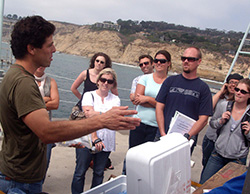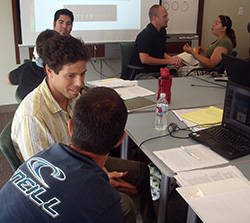Bio Grad Students Megan Eckles and Sam Lasse Help Bring Research into Area Classrooms
July 22, 2008
By Michael Dabney
Building upon the success of its BioBridge science education outreach program, the University of California, San Diego (UCSD) has this summer launched an enhanced initiative to further bring the excitement of scientific research directly into area high school classrooms. The new program has an interesting twist: participating UCSD doctoral students in research benefit as much as high school teachers and students.

While Socrates graduate students and teachers look on at Scripps Pier, Socrates Fellow Ignacio Vilchis explains how his doctorate research in ocean climate study is shedding light on bird and sea life in the southern Pacific.
Called the Socrates Fellows program, the project-recently funded through a five-year $3 million GK-12 grant from the National Science Foundation (NSF)-pairs high school science teachers with UCSD doctoral students who are currently working in active research laboratories at the university under the guidance of faculty researchers.
In the program, each teacher-doctoral student team (nine teams funded per year) will work together over the summer to develop innovative ways to integrate the doctoral student's research focus (including its science concepts and themes) into the teacher's science classroom curriculum starting in the fall.
This summer's participating teachers are from Sweetwater Union High School District, San Diego Unified School District, Grossmont Union High School District, and Helix Charter School. The graduate students represent various areas of biological research, including Biological Sciences, Biomedical Sciences, Marine Biology at Scripps Institution of Oceanography (SIO), and Biological Oceanography at SIO.
To greatly facilitate an exciting team learning experience, research focus areas this summer are both leading-edge and different, ranging from studying the communication and navigation systems of social bees to investigating the physiology of the human gastrointestinal tract, and how various organisms survive under extremely high pressure in the deep sea.
Says Maarten Chrispeels, professor of Biological Sciences at UCSD and principal investigator of the grant: "That's the beauty of the program -- each member of the team learns and benefits from the other. The teacher, by interacting and connecting with young scientists doing cutting-edge research, becomes energized and will gain new insights into presenting important scientific concepts in the classroom. The doctoral students, through their interaction with teachers, learn how to best communicate and apply their research in an entirely new and engaging way so that it can excite high school students about learning science."
But the potential impact of the Socrates Fellows initiative does not stop there, say UCSD researchers close to the program. It may also provide new ways to think about graduate school education at the university, explains Kim Barrett, Dean of Graduate Studies and co-Principal Investigator of the program's grant.
Says Barrett: "Many people think of graduate school as only a training ground for future faculty, or a mechanism for turning grad students into 'clones' of their advisors, so to speak. The Socrates program will greatly broaden the educational experience of Ph.D. students by exposing them to partnerships and collaborations with teachers and other graduate students from diverse disciplines, which will boost their teamwork and problem-solving skills, and broaden their professional outlook."
The Socrates Fellows project builds upon the success of the university's BioBridge Program, an initiative begun in 2005 in the laboratory of researcher Roger Tsien. The goal of BioBridge is to link the educational and scientific communities in creating hands-on laboratory experiences that help enhance bioscience achievement at schools in underserved areas of San Diego.
"Through our BioBridge partnership with district schools and UCSD scientists," says Jeremy Babendure, Ph.D., director of BioBridge, "we found that BioBridge not only boosted kids' excitement and interest in science after program activities were integrated into classrooms, it also enhanced teachers' enthusiasm about teaching science, and provided a great stepping stone to introduce a program like Socrates."

Socrates Fellows and teachers discuss team-building information at the beginning of summer session.
Says Loren Thompson, UCSD Assistant Vice Chancellor, Student Educational Advancement (SEA), a key collaborator in both the BioBridge and Socrates Fellows programs: "We believe the Socrates Fellows program is a natural extension of our efforts to create and foster engaging science education, thereby helping to motivate more high school students, particularly those from low-income, first-generation college backgrounds, to pursue undergraduate degrees in science, as well as to encourage more talented graduate school students to enter careers dedicated to the improved science teaching in university or public school environments."
Working closely with Babendure in overseeing the day-to-day operation of Socrates Fellows, including the program's summer institute, is Shelley Glenn, lead coordinator of the program.
Key to the ongoing success and effectiveness of the Socrates Fellows project is the follow-up interaction between teachers and doctoral student teams that occurs. Following their five weeks of summer collaboration, each team will continue its work in the teacher's school, starting the next fall, with the doctoral student putting in an average of 10 hours per week in the teacher's classes.
Such classroom involvement by doctoral students can have a powerful influence on high school students, says Chrispeels. "The doctoral students will help break down the stereotype - heavily promoted by TV - that scientists are all white-haired, white males with German accents. Students will also come to believe that they, too, can become scientists, and that science is truly really cool."
Dianna Carberry, Assistant Superintendent for Instruction in the Sweetwater Union High School District, agrees that the potential effect on students and teachers alike will be very positive. "This program gives teachers the structured support to expand their science teaching development and curriculum in an exciting way without diverting from the academic standards that their schools must follow. This can only help our students."
In addition, Barrett says that by exposing UCSD doctoral students to high school students from diverse backgrounds in the community "the university is in a better position of attracting more undergraduates and graduate students from these backgrounds to UCSD as majors in science and engineering."
Other principle partners in Socrates Fellows Program are: Emory University's PRISM (Problems and Research to Integrate Science and Mathematics) Program; SIO's Communicating Ocean Science to Informal Audiences (COSIA) class; UCSD Center for Teaching Development, and the UCSD Educational Studies Program.
This year's Socrates Fellows (and their UCSD faculty advisors) are: Alfred Chappell (Biomedical Sciences: Dr. Kim Barrett [faculty advisor]); Megan Eckles (Biological Sciences: Dr. James Nie); Kate Hanson (Biological Oceanography, Scripps Institution of Oceanography: Dr. James Leichter); Samuel Lasse (Biological Sciences: Dr. Colin Jamora faculty advisor); Rosa Leon-Zayas (Marine Biology, Scripps Institution of Oceanography: Dr. Doug Bartlett); Lindsay Lewellyn (Biomedical Sciences: Dr. Karen Oegema); Johnnie Lyman (Climatology, Scripps Institution of Oceanography: Dr. Richard Norris); Ignacio Vilchis (Biological Oceanography, Scripps Institution of Oceanography: Drs. Mike Landry and Lisa Balance), and Sheila Walsh (Marine Biology, Scripps Institution of Oceanography).
This year's Socrates Fellows Teachers: David Buse (Southwest High School); Chris Everett (Mira Mesa High); Jeff Kepper (Helix High); Rachel Stein (Castle Park High); Darci Kimball (Castle Park High); Jennifer Jackson (Chula Vista Middle School); Nathan Samuels (Mt. Miquel High); Frank Luera (Mt. Miquel High), and Don Mackay (Southwest High).
For more information on the Socrates Fellows Program, visit the BioBridge (Renamed as Sciencebridge) or Socrates program websites.
More Information:
Socrates Fellows Program
Biobridge Program (Renamed as Sciencebridge Program)
